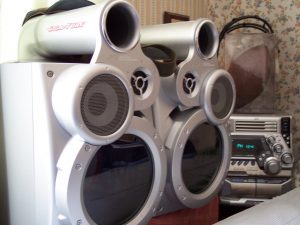Noise in residential areas is a fact of life especially in built up areas but some noise can be irritating especially if it is prolonged or interrupts your sleep. Here’s some tips on how to deal with unwanted noise from outside of your home.
Disclaimer: None of this should be taken as legal advice, it’s just some suggestions that have worked for us and other people we know. If you need further clarification, speak to your appropriate local law enforcement agency.
What is unacceptable noise?
- The Environmental Protection Authority of Victoria defines noise pollution as sound at a level which is annoying, distracting or physically harmful.
- People have different tolerances to noise so what is acceptable to one person may be unacceptable to another.
- The time of day and activity generating the noise can also influence what is acceptable noise [1].
Sources of unacceptable noise can include:
- Motor vehicles and car stereos.
- Petrol powered tools (lawnmowers, chainsaws, etc.), electric power tools and even some hand tools.
- Heating or air conditioning equipment.
- Musical instruments (amplified or unamplified) and PA systems.
- Appliances including TVs, stereos, radios, vacuum cleaners, etc.
- Alarms
- Excessive dog barking
- People yelling
- Stomping on floors in multi-story apartments.
Before noise becomes an issue
- Accept that in residential areas there will always be some sort of noise. If it’s a one off or infrequent situation and not excessively loud, then it’s not worth worrying about.
- A set of earplugs (when sleeping) or a fan can be used to drown out a noise that occurs infrequently.
- Know your tolerance for noise. Within reason, there’s no wrong answer to this but if the sound of constant traffic is annoying for you, it’s best not to live next to a busy road.
- When deciding to apply for a rental, visit the property a few times at different times of the day to see if there could be any activities that might generate unacceptable noise for you.
- Get to know your neighbours when you move in. This is a great thing to do for many reasons and it also makes dealing with noise at a neighbourly level easier.
- Most street level noise will be outside of your control so we’ll focus here on neighbourly noise.

If you are on the receiving end of unacceptable noise from a neighbour
- First talk to your neighbour. Rehearse what you want to say beforehand, visit them at a reasonable time, be polite and focus on the noise rather than the activity causing it.
- Although it can be more difficult for some people, face to face communication is the best way to make sure there are no misunderstandings.
- Try to offer a solution to the problem. There may be a solution that allows the neighbour to continue their activity in a way that doesn’t impact you.
- Often, a neighbour may not realise that an activity is impacting you and the problem can usually be solved at this level.
If the problem persists after repeated talks with your neighbour
- Talk to other neighbours to see if the problem is affecting them. If other neighbours are affected, gentle group pressure can get your neighbour to act.
Formal complaints
- If none of the above works, a formal complaint can be made to your body corporate if you and the neighbour are part of one.
- Other possible channels include your local police, council, a mediation service or a magistrate’s court.
- This should be your last step and not the first one as you are likely to really sour any relationship you have with your neighbour.
- You’ll also have a better chance of a successful outcome if you have other neighbours who are willing to back your claims.

Just a thought
- Outside of something simple like calling the police to report a 400 strong party that’s out of hand or someone doing burnouts in your street, a formal complaint can be a long and draining process especially if it turns into a neighbourly feud.
- If you really like your home, it might be worth digging your heals in but a neighbourly dispute can take months to resolve and might really wear you down.
- There’s no right or wrong answer; sometimes it can be worth confronting a neighbour through a formal process.
- Other times it’s just easier to move to a better property which is an advantage that renters have over owners.
If you’re the one making the noise and a neighbour approaches you
- Be reasonable, polite and try to find a solution if a neighbour is affected.
- It can work in your favour if you pre-warn neighbours that could be affected about an unusually noisy activity and when you expect it to end (e.g. using a circular saw for 2 hours on a weekend, a backyard party).
- Meeting your quiet neighbours in the middle is better than the risk that the neighbours have to move and they are replaced with noisy neighbours.
- It’s rare but you may have a neighbour with unreasonable expectations (Your unplugged electric guitar in a closed room is too loud at 3pm).
- If this type of neighbour hassles you a lot, you may also have to decide whether to dig your heals in or move.
Most noise issues can be proactively dealt with when you move in but the good news is that should it happen, neighbourhood noise disputes can often be solved at a personal level. If you need to escalate things, consider getting other affected neighbours on board at an informal or formal level.
Further Reading:
[1] Here’s some guidelines from the EPA in Victoria for what noise is acceptable at what times of the day. Check the EPA in your state if you live outside of Victoria:
https://www.epa.vic.gov.au/for-community/environmental-information/noise/residential-noise-law